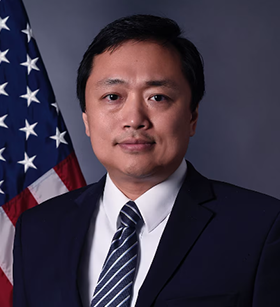Overview
The Fast-Track Action Committee (FTAC) on Digital Twins (DT) was established April 2024 in response to the 2024 National Academies Report: Foundational Research Gaps and Future Directions for Digital Twins. This FTAC will develop a Digital Twins Research and Development (R&D) Strategic Plan, focusing on the fundamental and cross-cutting research and development challenges and opportunities that span digital twin applications.
According to the National Academies Report, a digital twin is a set of virtual information constructs that mimics the structure, context, and behavior of a natural, engineered, or social system (or system-of-systems), is dynamically updated with data from its physical twin, has a predictive capability, and informs decisions that realize value. The bidirectional interaction between the virtual and the physical is central to the digital twin (National Academies Report, 2024, p. 7).
Digital twins bring together many innovations and have been used in fields such as engineering, manufacturing, and precision medicine. Collection and utilization of data from countless IoT sensors for real-time modeling and simulation, when paired with AI/ML, can yield greater insights to manage and respond to national challenges. This technology has been proposed as a tool for climate change predictions, smart cities, smart agriculture, smart warehouses, energy delivery, design and testing of autonomous systems, military applications, and more.
The FTAC will serve as a coordination mechanism for federal R&D that will advance technology and accelerate the use of/early adoption of the digital twin models to address the Nation’s priorities and fast-track agency missions.
Co-Chairs
 |
Kirk Dohne |
 |
Simon Frechette |
 |
Steven Lee |
 |
Stacey Levine |
 |
Qing Wu |
Technical Coordinator
 |
Tomas Vagoun |
Membership
- Department of Defense
- Defense Advanced Research Projects Agency
- Military Services: Air Force (Air Force Research Laboratory)
- Military Services: Navy
- Department of Education
- Department of Energy
- Department of Health and Human Services
- National Institutes of Health
- Department of Commerce
- National Institute of Standards and Technology
- Department of Transportation
- Federal Highway Administration
- National Aeronautics and Space Administration
- National Science Foundation
The following organizations in the Executive Office of the President shall also be represented on the FTAC:
- Office of Science and Technology Policy
Cooperating departments and agencies shall include other such Executive organizations, departments, and agencies such as the NSTC, CSTE, NITRD Subcommittee, and/or others that the FTAC co-chairs may designate, as appropriate.
↑ Top
Coordinated Activities
- Federal Register Notice: 89 FR 51554, “Networking and Information Technology Research and Development Request for Information on Digital Twins Research and Development”, June 18, 2024. Public Responses, July 2024.
Resources and References
- National Academies of Sciences, Engineering, and Medicine. 2024. Foundational Research Gaps and Future Directions for Digital Twins. Washington, DC: The National Academies Press. https://doi.org/10.17226/26894
- A National Academies of Sciences, Engineering, and Medicine-appointed ad hoc committee, Committee Members and Sponsors, Events, Publications.
- Charge to the Fast-Track Action Committee on Digital Twins R&D, May 22, 2024.
Can’t Find What You Need?

